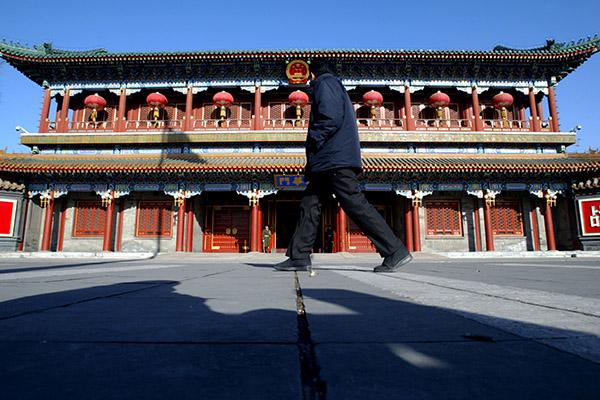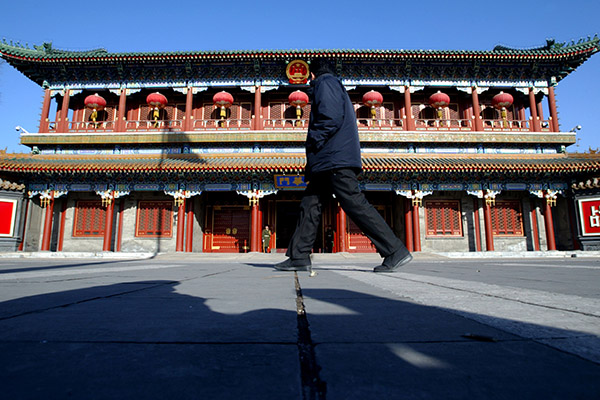
Additional reporting by Adam Jourdan of Reuters; 路透社Adam Jourdan补充报道
Crackdown
Two more executives from the China National Petroleum Company (CNPC) were recently reported to be questioned by Chinese authorities, according to Reuters. This was part of a wider graft investigation into the state energy giant, following a string of other probes on both international and domestic enterprises.
For instance, in October 2013, Chinese authorities had arrested and charged Lei Yi, the chairman of the world's largest producer of refined tin, Yunnan Tin Co, for accepting bribes.
GlaxoSmithKline Plc (GSK), as the most noticeable case, was charged by the Chinese police in July 2013 for allegedly having funnelled up to three billion yuan (308 million pounds) to travel agencies to facilitate bribes to doctors and officials to boost its drug sales over a six-year period beginning 2007.
Several other multinational pharmaceutical companies as well as foreign dairy producers and car makers were also investigated for corruption allegations.
The investigation into CNPC and its listed unit PetroChina was announced in August and September, and also that five former top executives at PetroChina and CNPC were being investigated for "serious discipline violations" - shorthand generally used to describe graft. They included Jiang Jiemin, former chairman of both entities. The investigation appears to be the biggest graft probe into a state-run firm in years.
Beijing too has announced the investigation and possible arrest of a handful of senior officials since last year. President Xi Jinping has made fighting corruption a key plank of his new administration, saying the problem is so severe it could affect the ruling Communist Party's survival.
Such campaigns are not new in China. In fact, they happen every few years given that the Party has a history of solving all kinds of problems, from anti-pornography to wildlife protection, through one-off “movements.”
Corruption in China is gradually snowballing into an international issue; a result of the country’s integration into the global economy on one hand, and on the other, because of the increased enforcement of foreign anti-corruption laws. And punishment for the same is gaining new elements by the day.
Punishment
As of today, the GSK case is far from closure. For the multinationals operating in the country, its final result would create a precedent on whether China would (in the future) pursue a criminal case against a foreign company should it face corruption charges.
In the GSK case, four senior Chinese GSK executives were detained, one of whom gave an account of how the alleged bribery was carried out on state television. But sources told Reuters it was more likely that some of GSK’s Chinese executives and not the drug maker itself would be charged by authorities.
Police are also unlikely to lay criminal charges against Mark Reilly, GSK's former head of China operations who has been voluntarily assisting authorities in the investigation, the sources said.
If a company is charged, according to current laws and regulations, the result would likely be significant fines and disruption to its operations in China. So much so that the State Administration of Industry and Commerce (SAIC) may even revoke a firm’s business licence under extreme circumstances.
In another case of corruption and subsequent graft, four executives of the mining company Rio Tinto were jailed in March 2010 for taking bribes and stealing commercial secrets. But although it was most serious such case against a multinational firm at that point in time, the company was never charged.
Individuals found guilty of serious bribe-giving can face from 10 years to life in prison, according to China's criminal code. However, a voluntarily confession can result in a lighter sentence.
Legal action may also be taken against managers responsible for a region or sector who might have been aware or have had knowledge of the criminal act, or at least could have known about it but did not exercise their duty to prevent it.
Lawyers say any fines levied against GSK would depend on the severity of the charges against its executives.
U.S. authorities are also investigating the British drug maker for violations of the Foreign Corrupt Practices Act (FCPA) in the wake of Chinese accusations for which it could also face interrogation from Britain's Serious Fraud Office.
Foreign jurisdiction
Since the U.S. FCPA enforcement has steadily increased over the last two decades, it is not surprising that there may be chances of it getting involved in corruption cases in China, where the world’s second-largest quantum of economic activities are currently underway. In 2012, the U.S. SEC received more than 300 whistleblower complaints concerning bribery and corruption, 27 of which came from China.
As the name suggests, the FCPA criminalises corrupt offers or payments to foreign (non-U.S.) public officials. Private sector bribery or commercial bribery does not get caught by the FCPA. The tricky part is that the FCPA’s definition of “public official” can be very different from the Chinese interpretation, according to s Nicolas Groffman, Shanghai-based partner at DLA Piper.
“The FCPA only aims at bribery of government officials, but the FCPA's interpretation of who is a government official is much broader than the Chinese interpretation,” he says.
As a result of this, the U.S. definition of “official” includes people who work in state-owned enterprises or state-controlled institutions, some cases prosecuted by the Chinese as commercial bribery ones might be considered by American authorities as official bribery cases which the latter can also prosecute.
And this consideration is not limited to multinationals like GSK. A Chinese company could fall under the jurisdiction of the FCPA in a number of ways, suggests Omar Qureshi, partner at CMS Cameron McKenna.
The FCPA has jurisdiction against a domestic concern, or a U.S. individual. And since the “domestic” is very broadly defined, if a Chinese company has securities, like part of their shares or bonds listed on a U.S. trading exchange, it is liable to get charged for bribery it indulges in anywhere in the world.
“The U.S. Department of Justice (DOJ) even asserts the right to prosecute where the only connection to the U.S. is that a bribe was paid by bank transfer in U.S. dollars,” adds Qureshi.
This is because all U.S. dollar transactions technically go through the New York clearing system, which means an act relating to the bribery offence occurs on the U.S. soil. The DOJ thus asserts they have the right to investigate and prosecute.
On the other hand, U.S. authorities generally do not look to prosecute the foreign public official for his/her involvement in accepting or requesting the bribe. And China is very unlikely to send anybody involved in their case to the U.S. But if a person lands in the U.S. for any reason- even if he himself isn’t a suspect - U.S. authorities can detain him to obtain evidence.
“The U.S. authorities have full power to detain, prosecute or even imprison foreigners as long as they are in U.S. territory,” says Groffman.
Under the UK Bribery Act, by contrast, if the Chinese company “carried on a business or part of a business” in the UK, then any acts of that Chinese company anywhere in the world would technically be under the jurisdiction of the Bribery Act. However, what qualifies as “carrying on a business or part of a business” is unclear and has yet to be tested in the English court, so uncertainty remains as to how wide this provision really is, says Qureshi.
“One has to question whether the UK prosecutor would have the resources or appetite to investigate and prosecute the acts of a Chinese company in, say, Russia, in order to prosecute any bribery in the UK in relation to those acts. In practice, this may be unlikely. However, the risk remains,” he says.
Risks prevention
Whilst looking at the foreign anti-corruption laws’ growing influence in China, we should not forget that commercial or private sector bribery is also outlawed by PRC law.
An unfortunate fact is that various types of bribery, commercial and/or official, and other forms of corruption are being carried out every day, and it makes China a more expensive country in terms of anti-corruption. This may partly be due to historical, cultural and institutional reasons in the country.
Like in the pharmaceutical industry, gifts and hospitality are offered and even given to prospective customers as bribes to win business in other industries as well. Another seemingly common example is where large Western corporates give work placements or jobs to relatives of important officials or decision makers in a client organisation or government authority. Suffice to say that there are better and more sophisticated covers for bribery that are coming up every single day.
Using a third-party intermediary to make illegal payments is a common method, and on this issue, Chinese and foreign law have somehow diverged.
“Liability for bribery is less likely under Chinese law if you use an agent to make a payment than it would be under UK law or U.S. law. In fact sometimes, the Department of Justice might think that (using an agent to bribe) is even worse because you’re obviously dishonest,” says Groffman.
In general, Qureshi suggests companies make sure that they have designed and implemented the sort of policies and procedures expected by U.S. and UK authorities in order to provide them with the best opportunity for preventing wrongdoing in the first place and also to mitigate any wrongdoing when it does occur.
“It is vital that corporates conduct proper risk assessments across their business so that they know what the local risks are, how those risks occur and what, therefore, needs to be done to combat and minimise those risks from materialising,” he says.
Although presently there is no requirement to put in place anti-bribery systems and controls under Chinese law, the FCPA makes it an obligation for corporates covered by it– and not having such controls is itself a breach of FCPA guidelines.
“Where solid systems and controls are in place, this can result in protecting the corporate from prosecution or sanction, even where the individuals involved (who may be at senior positions in the organisation) are prosecuted,” says Qureshi.
“When you have all these programmes and you do all the necessary compliance work, if anything goes wrong, it’s just that particular person who paid the bribe. It's not an institutional problem,” Groffman adds.
Programmes
As far as the system is concerned, Groffman suggests it should be an organic mixture of overseas and local compliance officers, plus supervision from external lawyers and counsel in terms of staffing.
A proper combination of Chinese law and the FCPA (and other foreign laws) is necessary for the corruption compliance programmes of Chinese businesses. And any compliance rule must be practical, illustrated and written in authentic Chinese, and should tell people what they can do rather than prohibit everything. Moreover, stop educating people on moral values.
“Don’t tell everyone how immoral bribery is. The point is to stop them paying the bribes. You have to give examples of what happens in real life and show you understand their business,” says Groffman.
Despite being helpful in increasing Chinese companies’ awareness of compliance, the ongoing anti-corruption campaign is unlikely to have long-term effects, just like previous “movements,” according to Groffman. Instead, restructuring of the society and the government would help in having the desired long-term effect.
“I am optimistic that other changes will happen, which will reduce the likelihood of corruption. As the economy develops, there may be less need for corruption. Becoming a more developed, better organised and fairer country, which is what China is trying to do, will reduce bribery,” he says.
反腐行动
据路透社报道,最近又有两名中国石油天然气集团的管理层人员被中国有关部门询问。这是对这家国有能源巨头的贪腐案的更进一步的深入调查的一部分。此前已有一连串国际或中国企业陷入调查。
例如,去年10月,中国当局以受贿罪名逮捕了世界最大的锡生产企业云南锡业集团董事长雷毅。
其中最引人注目的案件,则是去年7月葛兰素史克被中国警方指控其在2007年起的六年中,曾透过旅行社对医生和官员输送了多达30亿元人民币(3.08英镑)的贿赂,以提升其药品销量。其他数家跨国医药公司,乃至奶粉和汽车厂商也因为涉嫌腐败遭到了调查。
对中石油集团及其上市公司中国石油天然气股份有限公司的调查则从去年八九月份开始公开,有五位前高层管被调查“严重违纪”行为——这通常用来代指贪腐行为——其中包括曾担任两大实体董事长的蒋洁敏。这很可能是多年来对国有企业贪腐的最大的一次调查。
此外,从去年以来,北京已经宣布调查或逮捕了一大批高级官员。新上任的习近平主席已将反腐败列为他执政的一大重点,他表示腐败问题已经严重到威胁执政的共产党的生存的地步。
此类反腐行动在中国并不新鲜。事实上,每隔若干年就会有类似的行动,因为执政党在历史上就习惯于以一次次“运动”的方式来解决从扫黄打非到野生动物保护的各类问题。
但是,其中当然也有新的元素。无论如何,在中国发生的腐败案件已经变得更像是国际事件,这就是一大变化。这一方面是因为中国越发融入到世界经济中,同时也是外国反腐败法律的执行不断强化的结果。而对案件的处罚也变得不再仅仅是中国国内事务。
处罚
目前葛兰素史克案远未结束。对于在华的跨国公司来说,此案最终结果将为中国是否会对一家外国公司提起腐败相关的刑事指控提供先例。
本案中有四名中国高管被捕,其中一人在国家电视台上坦白了行贿的方式。但是据消息来源对路透社透露,最终面临起诉的可能仅限于该公司部分中国高管,而不是该公司本身。
消息人士还透露,警方也不大可能对葛兰素史克中国公司业务前负责人——英国人马克锐提起刑事指控。他事后一直在自愿协助调查。
如果一家公司被指控,根据现行法律法规,其后果可能是巨额罚款,并且其中国业务也可能收到严重冲击。在极端情况下,中国工商行政管理局有权吊销企业的营业执照。
在另一起涉及跨国公司的贪腐案中,矿业巨头力拓的四名高管在2010年3月的时候因受贿和盗窃商业秘密被判监禁,这是此前中国针对跨国公司的最严重案件。但力拓本身并未被起诉。
根据中国刑法,贿赂情节严重的个人可能面临10年徒刑。主动坦白则可能换取较轻判决。如果能证明负责的地区或部门经理对有关犯罪行为有认知或了解,或至少应该了解但却没有尽到知情责任,则也可以对他们采取法律行动。
律师们表示,如果要对葛兰素史克的罚款,其金额将取决于对其几名高管的起诉罪名的严重程度。
在中国方面调查此案之后,美国相关机构也正在对这家英国制药厂是否违反了美国《海外反腐败法》(FCPA)进行调查,同时葛兰素史克还可能面临英国重大欺诈案办公室的质询。
外国管辖权
由于美国《海外反腐败法》的执行在过去二十年之内不断稳步加强,所以并不奇怪它有可能会介入到中国的案子中来,特别是中国这些年来已经变成世界第二大规模的经济活动的发生地。2012年,美国证券交易委员会收到了超过300起涉及到贿赂的腐败的举报,而其中27起来自中国。
顾名思义,《海外反腐败法》将针对海外(非美国)政府官员的腐败输送或贿赂行为入罪。纯私营领域内的贿赂,或一般商业贿赂,则不在其管辖之内。欧华律师事务所驻上海合伙人Nicolas Groffman指出,其中很微妙的部分是,该法令对“政府官员”的定义与中国的解读非常不同。
“FCPA只针对对政府官员的行贿,但是FCPA对什么人是政府官员的定义比中国要广泛得多”他说。
由于美方的“官员”定义还包括了在国有企业以及国家控制的机构工作的人员,所以一些在中国被作为商业贿赂案起诉的案件可能会被FCPA认为是政府贿赂案,因而认为美方也有权起诉。
这并不仅限于葛兰素史克这样的跨国公司。金马伦麦坚拿事务所合伙人Omar Qureshi说,一家中国公司也有各种原因可能会落入到FCPA的管辖之下。FCPA对任何美国国内相关,或者美国人都有管辖权。而这个“国内”的定义也非常宽泛。如果一家中国公司在美国发行了证券,例如部分股票或者债券,甚至只是通过子公司在美国任何一家交易所上市,那么他们在世界任何地方的贿赂行为都可以被FCPA所追究。
“甚至对于与美国仅有的联系仅仅在于通过银行转账的贿赂是使用美元支付的情况,美国司法部也主张其起诉权利。” Qureshi补充道。
这是因为技术上讲,一切美元交易都会通过纽约结算系统。这意味着有一个与该违法行为相关的行为发生在了美国的土地上,美国司法部从而主张他们也有调查与起诉的权力。
从另一方面讲,美国一般不会寻求起诉外国政府官员受贿或索贿的行为。中国也不太可能将在中国的涉案人员交给美方。但是如果某人因为任何原因来到了美国,就算他不是嫌疑人,也有可能被扣留,以获取证据。
“美国当局有完全的权力扣留,起诉甚至监禁外国人,只要他们在美国国境内。”Groffman说。
作为对照,在英国《反贿赂法案》下,如果一家中国公司在英国“开展业务或部分业务”,那么该公司在世界任何地方的行为从技术上来说都在反贿赂法的管辖之下。但是,怎样才符合“开展业务或部分业务”却不是很清楚,也没有经过英国法庭的验证,所以关于这个规定具体有多广,不确定性仍然存在,Qureshi说。
“人们会质疑英国检察机构是否会有这样的资源或兴趣去调查起诉一家中国公司在比如俄罗斯等地的行为,以便起诉与相关的在英国发生的贿赂。现实上这也许不太可能。但是风险仍然存在。”他说道。
风险防控
在关注外国反腐败法规对国内渐渐增强的影响的同时,我们也不应忘记国内法律规定商业同样是非法行为。
一个不幸的事实是,包括政府贿赂和商业贿赂,各种形式的腐败每天都在上演,这令中国的反腐败成本相对很高。这也许部分是由中国各种复杂的历史、文化和制度原因造成的。
正如我们在医药行业的案件中所见,不当的礼物和接待被当做贿赂给予潜在的客户以赢得生意。另一类看上去广泛存在的案例则是一些大型西方公司向政府要员或客户机构的决策者的亲属提供工作职位。贿赂的方法正在变得更加隐蔽和聪明。
使用第三方媒介来支付非法款项是一个常见的方式。而对此中外法律的规定又有所不同。
“如果你使用了一个中介来支付,在中国将受到像在英国或美国法律下那样的追究的可能性没有那么大。”Groffman说。“事实上有时美国司法部反而会认为(使用中介行贿)的错误更加严重,因为你显然是不诚实的。”
总的来说,Qureshi建议企业一定要确保设计并执行了美国和英国有关部门的规定的系列政策和规程,旨在最大限度从源头上防止违规行为,并且可以缓解一旦发生的违规行为的危害。
“公司对其各项业务采取适当的风险评估是至关重要的,”他说,“这样他们才知道各地的风险是什么,这些风险是怎样发生的,以及因而需要做些什么去对抗并最小化这些风险转化为现实的可能。”
虽然目前中国法律尚未要求企业一定要有落实到位的反贿赂防控体系,FCPA却已经将其规定为一项义务——没有相应的控制措施本身就是违反FCPA的行为。
“当的可靠的体系和防控落实到位,即使有个人(也许是组织的高层)涉案并被起诉,这也将保护公司不受起诉和制裁。” Qureshi说。
“当你有了这些规程,完成了所有应有的工作,如果有任何事情出了问题,那也只是那个个别人的行贿行为,而不是系统的问题。”Groffman补充道。
规程
关于这个体系,Groffman建议道,从人员上需要保证它是一个由海外和本地合规负责人的综合,并且加以外部律师和顾问的监督。
对于中国或在华公司来说,反腐败合规流程中将中国法律和FCPA(以及其他外国法律)的规定恰当的结合是非常必要的。任何一条规定都应该是现实可行的,用地道的中文写好,并最好配合插图。应该告诉人们可以做什么而不是什么都禁止,他说。另外,不要试图从道德上教育人。
“不要只是对人说贿赂是多么不道德。重点在于制止人们去行贿,以及怎样去做到这一点。你需要给出现实生活中的实例,并且表现出你对他们的业务的了解,”他说道。
虽然目前的反腐对提高中国公司对合规的重视有所帮助,Groffman认为它正如此前的很多次“运动”一样,很难维持长期的效果。相反,只有社会与政府的转型才能带来长期效果。
“我对于其他可能降低腐败的可能性的改变持乐观态度。经济发展了,也许就不再那么需要腐败了。成为一个更发达,更有秩序,更公平的国家将会减少贿赂,这也正是中国正在努力尝试的。”他说。
Follow us on Twitter: @ALB_Magazine.




